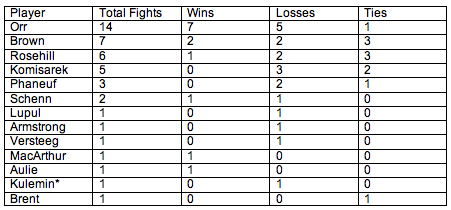That's the Leafs' fighting record so far this year. 13 wins, 18 losses, and 11 ties. Before digging into these numbers a bit, a short preamble:
This past off-season, while writing for LeafsHQ under my old moniker ‘Fleet Fox', I put together a win/loss fight record for the top 30 fighters in the league, and also put together the win/loss fight record for the Leafs' 2009-2010 season. Given the emphasis Brian Burke has so explicitly put on his team being capable of defending itself via fighting, it seemed a natural thing to investigate.
Not only are fights fun to keep track of but their effect on game outcomes is also an interesting concept to explore. Obviously, we have all seen fights change the momentum and character of a game before but how often does that really happen?
Head over the jump to find out.
In the aforementioned article about The Leafs' fights, I decided to track which team scored the next goal as a way of testing whether or not fighting has any tangible impact on a game's momentum, and sorted the results by fights won, lost, and tied. There are obviously more precise ways of going about this, such as setting a time limit before and after fights and looking for shifts in Corsi numbers, number of hits, save percentages, not to mention a whole host of other advanced statistics that might provide some insight into the changing dynamics of a game, but I think that my rudimentary study is still worthwhile, not to mention a heck of a lot less work. Today, I've decided to run the same little study again on this season's numbers.
So without further ado, I present to you the numbers for the 2010-2011 Toronto Maple Pugilists. A few notes on the numbers are beside the chart. All info is from www.hockeyfights.com.
 |
- The team holds a record of 13 wins, 18 losses, and 11 ties, and has been in 42 scraps so far. That's good for 10th most fighting majors in the league.
- Orr is the only fighter on our team that holds a winning record.
- The Leafs are the first team to score after a fight 48% of the time, opponents score next 42% of the time, and no one scores again 12% of the time. Note that the numbers don't quite add up because I've rounded them up.
- Although roughly 54% of the time the Leafs do not score the next goal, the fact that they're generally outscored anyway makes this a negligible difference.
- When the Leafs win a fight this season, they score the next goal 46% of the time, but the opposition also scores next 46% of the time, and no one scores 8% of the time. We're talking about a small sample size of course, but obviously, winning fights isn't doing this team any big favors.
- When the Leafs lose a fight this season, they score next 39% of the time, the opposition scores next 56% of the time, and no one scores again 17% of the time.
- When the Leafs fight to a draw, they score next 73% of the time, their opponents score next 18% of the time, and no one scores 11% of the time.
- Put another way, the Leafs see no advantage on the scoreboard 54% of the time after they've won a fight, and see no advantage on the scoreboard 73% of the time after they've lost a fight. Tying, on the other has been quite lucrative for the Leafs, although I would imagine that this would even out fairly quickly with a larger sample size.
Here's a table with individual player numbers:
* Kulemin is listed as having been in one fight, but he did not receive a fighting major. His "combatant", Gleason, did.
It's very important not to get too caught up in this tiny sample size, and start making bold pronouncements about whether or not fighting is of any use to a team's success in the regular season. That said, I'll admit that even after such a quick and limited study such as this, I would be very surprised to find out that there was any worthwhile connection between goal scoring and fighting - win or lose.
For me, fights are a fun aspect of the game in and of themselves, and I don't really need any further reason to want them to remain a part of the game. That said, I'm not crazy about keeping the likes of Colton Orr in the lineup. Our fighters being capable hockey players has got to be much more important than their win/loss records at fisticuffs.




Comment Markdown
Inline Styles
Bold: **Text**
Italics: *Text*
Both: ***Text***
Strikethrough: ~~Text~~
Code: `Text` used as sarcasm font at PPP
Spoiler: !!Text!!